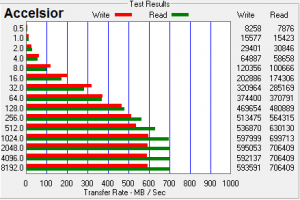ATTO Disk Benchmark is perhaps one of the oldest benchmarks going and is definitely the main staple for manufacturer performance specifications. ATTO uses RAW or compressible data and, for our benchmarks, we use a set length of 256mb and test both the read and write performance of various transfer sizes ranging from 0.5 to 8192kb. Manufacturers prefer this method of testing as it deals with raw (compressible) data rather than random (includes incompressible data) which, although more realistic, results in lower performance results.

 I guess the question of just how much performance can be pushed through a single Thunderbolt cable just got answered….somewhat. Performance for both the Mercury Accelsior and Intel 910 is excellent when testing in a PC environment. Considering that Thunderbolt touts the ability to offer 10Gbps performance, this should translate roughly to just over 1.2GB/s transfer speed.
I guess the question of just how much performance can be pushed through a single Thunderbolt cable just got answered….somewhat. Performance for both the Mercury Accelsior and Intel 910 is excellent when testing in a PC environment. Considering that Thunderbolt touts the ability to offer 10Gbps performance, this should translate roughly to just over 1.2GB/s transfer speed.
CRYSTAL DISK BENCHMARK VER. 3.0 X64
Crystal Disk Benchmark is used to measure read and write performance through sampling of raw (0/1 Fill/compressible) or random data which is, for the most part, incompressible. Many new ‘SandForce Driven’ SSD owners who can’t wait to test the performance of their SSD often grab this program and run a quick test, not realizing that they are testing with incompressible data rather than compressible data used in testing by manufacturers. For our purposes, both drives with data that is ideally suited for their performance

 Crystal DiskMark scoring typically runs a bit lower than ATTO and something that definitely impressed us were the Intel 910 4k-QD32 results.
Crystal DiskMark scoring typically runs a bit lower than ATTO and something that definitely impressed us were the Intel 910 4k-QD32 results.
Up until recently, AS SSD was the only benchmark created specifically for SSD testing and it uses incompressible data. AS SSD, for the most part, gives us the ‘worst case scenario’ in SSD transfer speeds because of its use of incompressible data and many enthusiasts like to AS SSD for their needs.

 If you look at disk identification for the Intel 910, you might notice that the drive is being identified as a 200GB volume, as it might be while not part or a RAID configuration, yet the performance is definitely that of RAID.
If you look at disk identification for the Intel 910, you might notice that the drive is being identified as a 200GB volume, as it might be while not part or a RAID configuration, yet the performance is definitely that of RAID.

 We weren’t impressed with the IOPS performance of the Accelsior, however, we have no background on previous conditioning for this drive and we are here to test the Helios. As we can see with the 910, it is possible to push just under 150,000 IOPS through the Helios to the PC in a single Thunderbolt cable.
We weren’t impressed with the IOPS performance of the Accelsior, however, we have no background on previous conditioning for this drive and we are here to test the Helios. As we can see with the 910, it is possible to push just under 150,000 IOPS through the Helios to the PC in a single Thunderbolt cable.
 The SSD Review The Worlds Dedicated SSD Education and Review Resource |
The SSD Review The Worlds Dedicated SSD Education and Review Resource | 
800 GB/s or MB/s in the title?
Thanks…you know I have been working all weekend when…
yes scintest have 800 gb/s laser hard drive not releasing too puplic haveing a 800 gb/s laser hard drive in future game consoles be very fun
While prices remain high, Apple itself sells thunderbolt cables at $10 cheaper than the one you used: https://store.apple.com/us/product/MC913ZM/A/apple-thunderbolt-cable-20-m
hi there be fun having quadrupple 800 mb/s ssd in a ps4 xbox 720 or wii u 2